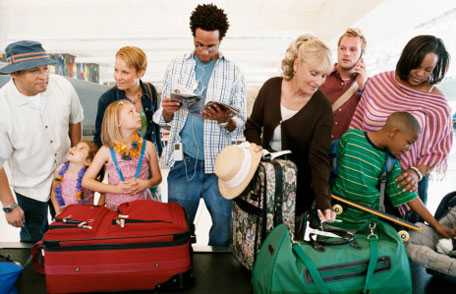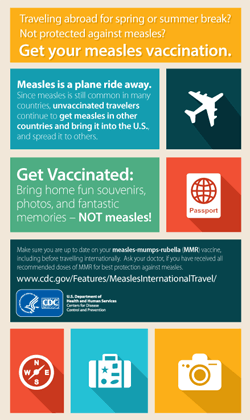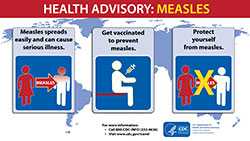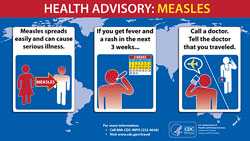Don’t Let Measles Be Your Travel Souvenir
 Stay safe and healthy when traveling abroad. Measles spreads easily through coughing and sneezing. It can cause serious illness, even death. Make sure you and your family are vaccinated for measles before you travel.
Stay safe and healthy when traveling abroad. Measles spreads easily through coughing and sneezing. It can cause serious illness, even death. Make sure you and your family are vaccinated for measles before you travel.
Are you traveling abroad? You might not think about measles when you are preparing for your trip, but it is a health risk in many destinations. Make sure you and your family are vaccinated for measles and other diseases before you travel abroad. After your trip, you want to bring home fun souvenirs, a camera full of photos, and fantastic memories—NOT measles!
Travelers who are not vaccinated are at risk of getting measles
Facts about measles
How is measles spread?
Measles spreads easily through the air by breathing, coughing, or sneezing. It is so contagious that anyone who is exposed to it and is not immune will probably get the disease.
What are the symptoms of measles?
Measles symptoms typically include:
- High fever (may spike to more than 104°F)
- Cough
- Runny nose
- Red, watery eyes
- Rash breaks out 3-5 days after symptoms begin
Learn more about measles.
Each year, unvaccinated people get infected while in other countries and bring the disease into the United States and spread it to others. Measles cases and outbreaks still occur in countries in Europe, Africa, Asia, and the Pacific. Worldwide, about 20 million people get measles each year; about 146,000 die.
The majority of measles cases that are brought into the United States come from unvaccinated U.S. residents. Earlier this year, we saw a large, multi-state outbreak of measles. This outbreak likely started from a traveler who got measles while abroad then visited an amusement park in California while infectious and spread the disease to others.
Measles is highly contagious and can spread to others through coughing and sneezing. Measles is so contagious that if one person has it, 90% of the people close to that person who are not immune will also become infected. An infected person can also spread measles to others 4 days before the rash even develops.
You can protect yourself from measles
The best way to protect yourself and your loved ones from measles is by getting vaccinated. The measles-mumps-rubella (MMR) vaccine protects against all 3 diseases. Two doses of MMR vaccine provide 97% protection against measles. People who cannot show that they were vaccinated as children and who have never had measles should be vaccinated.
Before any international travel—
- Infants 6 months through 11 months of age should have 1 dose of MMR vaccine.
- Children in the United States routinely receive MMR vaccination at 12 through 15 months of age.
- Infants vaccinated before 12 months of age should be revaccinated on or after their first birthday with 2 doses, each dose separated by at least 28 days.
- Children 12 months of age or older should have 2 doses, each dose separated by at least 28 days.
- Adolescents and adults who have not had measles or been vaccinated should get 2 doses separated by at least 28 days.
For more information, see “What can travelers do to prevent measles?“
Check CDC’s Travelers’ Health website for your destination to find other tips to keep you healthy while you travel. See a doctor or nurse 4 to 6 weeks before you travel, and be sure to tell him or her where you will be traveling abroad. Getting your MMR vaccine in advance of your travels ensures that your body has time to respond to the vaccine, so that you are protected from measles before you leave the country.
Watch for measles after you return
Watch your health for 3 weeks after you return. If you or your child gets sick with a rash and fever, call your doctor. Be sure to tell your doctor that you traveled and where, and if you have received MMR vaccine.
More Information
More Information
- Measles disease page (CDC Travelers' Health)
- CDC Measles Homepage
- Measles Vaccination Information
- Page last reviewed: March 16, 2015
- Page last updated: April 29, 2015
- Content source:
- National Center for Immunizations and Respiratory Diseases, Division of Viral Diseases
- Page maintained by: Office of the Associate Director for Communication, Digital Media Branch, Division of Public Affairs




 ShareCompartir
ShareCompartir


